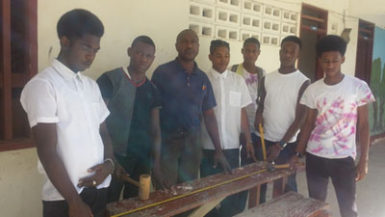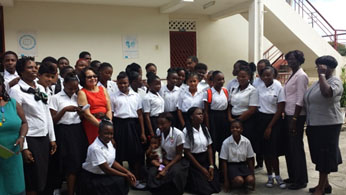Sophia is one of those working-class communities where unemployment is high, poverty is ever present and the rate of school dropouts is disturbing. When children leave school with little in the way of academic accomplishment to show for their effort they are ill-equipped for the job market. Sometimes, an absence of viable options take them in the direction of unpalatable alternatives.

Currently in its sixteenth year, the Mercy Wings Vocational and Day Care Centre run by the Sisters of Mercy is on a mission to transform the lives of at least some of those young Sophia residents who might otherwise simply drift down a disastrous road. What the centre seeks to do is to offer a curriculum that might steer some of them down the road to gainful employment, perhaps even self-employment.
For all the challenges that inhere in sustaining the mission, the institution’s Programme Director Paula Bess is optimistic. She has to be.
The Mercy Wings curriculum includes courses in a range of vocational subjects including General Construction, Care for the Elderly, Catering and Home Manage-ment and Child Care Management. The institution also offers structured courses in basic Mathematics and English, Literacy and Information Technology. On the whole, these are start-up courses designed, hopefully, to kick start the mature learning experiences of those who never made it through school. Here, there are no promises of high-flying careers. If you want it badly enough, however, you might just get enough to secure an honest job. That has happened for some of the Mercy Wings students.

Sometimes, good things happen for Mercy Wings. A student may secure an opportunity to further his or her studies at the Carnegie School of Home Economics or the Government Technical Institute. On the whole, however, it is an unending struggle. The educational demands of a depressed community means that what is offered by the Sisters of Mercy can no longer come even close to meeting those demands. There is no state subvention and institutions like Food for the Poor, IMEX and John Fernandes chip in with donations. Still, Bess says, some measure of state support can transform the institution.
What would help too is if the courses offered by Mercy Wings could secure some sort of official accreditation that might open further doors for its graduates. Up until now and having long applied for and paid for registration with the National Accreditation Council, the process has not gone forward. When this newspaper enquired, a spokesperson said the council was currently in the throes of reorganization; a disclosure that seems to mean that Mercy Wings has a further wait before its accreditation concerns can be addressed.
Bess is the holder of a Bsc in Management as well as post-graduate qualifications in Development Studies from the University of Guyana. She is evidently a believer in the supporting role that institutions like Mercy Wings can play in meeting some of the critical needs of communities like Sophia. However, years of experience have brought her to an acute understanding of the magnitude of the challenge.
At the moment, the institution provides tuition and a free meal every day for 32 students. It may have the physical capacity for 100, but whether it possesses the resource capacity to support that number is another matter.
What is lacking too, Bess says, is the full support of the parent community. She believes there are instances in which students receive little if any parental support. Their attendance at school is a function solely of their recognition that Mercy Wings might be their only way out of their present difficulties. Probably a third of the parents customarily attend PTA meetings.
Setting aside state support, Bess believes that Mercy Wings is well worth the greater attention of the private sector. She believes there is scope for pacts between private sector institutions and Mercy Wings that can, on the one hand, provide the latter with the resources necessary to enable it to effectively discharge its knowledge-sharing responsibility and, on the other, help private sector institutions to meet at least some measure of their skills needs.









